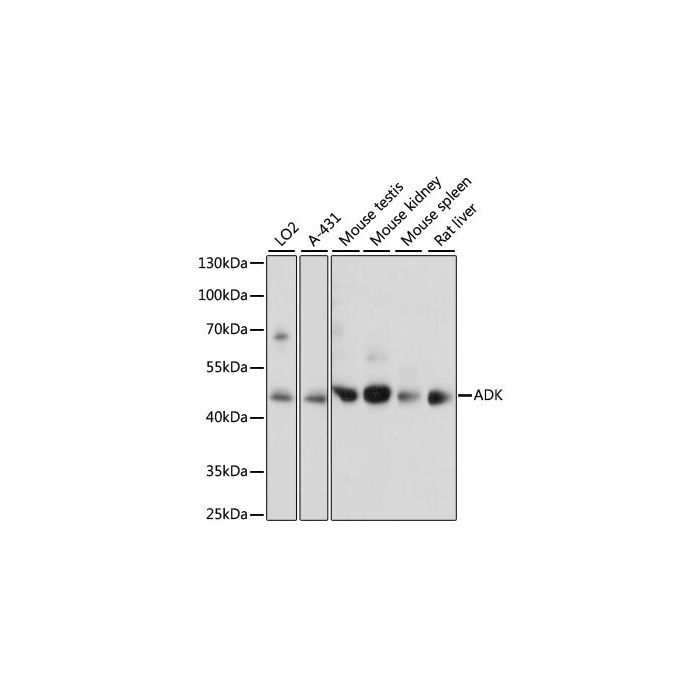ADK polyclonal, anti-human, mouse, rat
€388.00
In stock
SKU
BS72521
Background:
Adenosine kinase (ATP:adenosine 5 prime phosphotransferase) is an abundant enzyme in mammalian tissues that catalyzes the transfer of the gamma phosphate from ATP to adenosine, thereby serving as a potentially important regulator of concentrations of both extracellular adenosine and intracellular adenine nucleotides. Adenosine has widespread effects on the cardiovascular, nervous, respiratory, and immune systems and inhibitors of ADK could play an important pharmacological role in increasing intravascular adenosine concentrations and acting as antiinflammatory agents. The encoded protein does not present any sequence similarities to other well characterized mammalian nucleoside kinases. In contrast, 2 regions were identified with significant sequence identity to microbial ribokinase and fructokinases and a bacterial inosine/guanosine kinase. Thus, ADK is a structurally distinct mammalian nucleoside kinase that appears to be akin to sugar kinases of microbial origin.
Alternative Name:
Adenosine kinase, Short name=AK, Adenosine 5'-phosphotransferase, ADK
Application Dilution: WB: 1:500 - 1:2000
Specificity: ADK polyclonal antibody detects endogenous levels of ADK protein.
Immunogen:
Recombinant protein of human ADK
MW: ~ 41 kDa
Swis Prot.: P55263
Purification & Purity:
The antibody was affinity-purified from rabbit antiserum by affinity-chromatography using epitope-specific immunogen and the purity is > 95% (by SDS-PAGE).
Format:
1 mg/ml in Phosphate buffered saline (PBS) with 0.05% sodium azide, approx. pH 7.2.
Storage:
Store at 4°C short term. Aliquot and store at -20°C long term. Avoid freeze-thaw cycles.
For research use only, not for use in diagnostic procedure.
Adenosine kinase (ATP:adenosine 5 prime phosphotransferase) is an abundant enzyme in mammalian tissues that catalyzes the transfer of the gamma phosphate from ATP to adenosine, thereby serving as a potentially important regulator of concentrations of both extracellular adenosine and intracellular adenine nucleotides. Adenosine has widespread effects on the cardiovascular, nervous, respiratory, and immune systems and inhibitors of ADK could play an important pharmacological role in increasing intravascular adenosine concentrations and acting as antiinflammatory agents. The encoded protein does not present any sequence similarities to other well characterized mammalian nucleoside kinases. In contrast, 2 regions were identified with significant sequence identity to microbial ribokinase and fructokinases and a bacterial inosine/guanosine kinase. Thus, ADK is a structurally distinct mammalian nucleoside kinase that appears to be akin to sugar kinases of microbial origin.
Alternative Name:
Adenosine kinase, Short name=AK, Adenosine 5'-phosphotransferase, ADK
Application Dilution: WB: 1:500 - 1:2000
Specificity: ADK polyclonal antibody detects endogenous levels of ADK protein.
Immunogen:
Recombinant protein of human ADK
MW: ~ 41 kDa
Swis Prot.: P55263
Purification & Purity:
The antibody was affinity-purified from rabbit antiserum by affinity-chromatography using epitope-specific immunogen and the purity is > 95% (by SDS-PAGE).
Format:
1 mg/ml in Phosphate buffered saline (PBS) with 0.05% sodium azide, approx. pH 7.2.
Storage:
Store at 4°C short term. Aliquot and store at -20°C long term. Avoid freeze-thaw cycles.
For research use only, not for use in diagnostic procedure.
| Is Featured? | No |
|---|
Write Your Own Review

